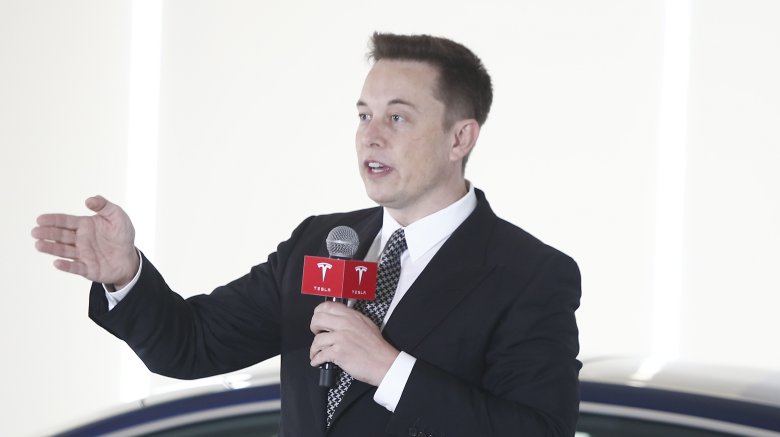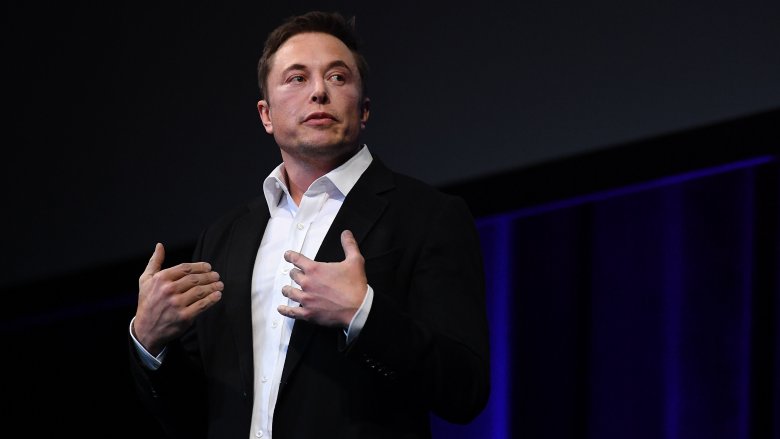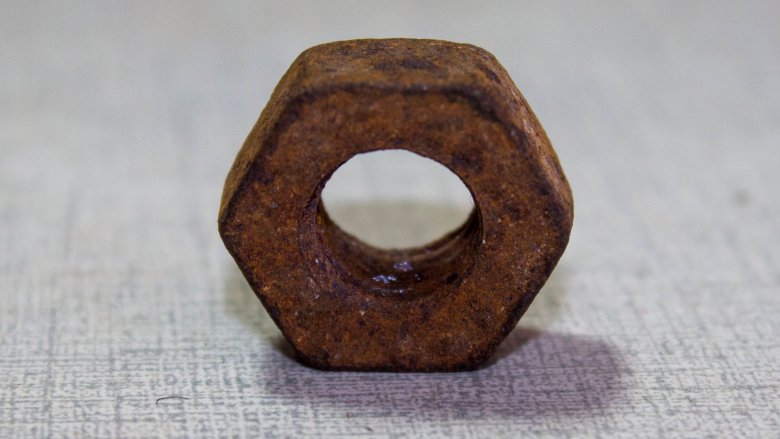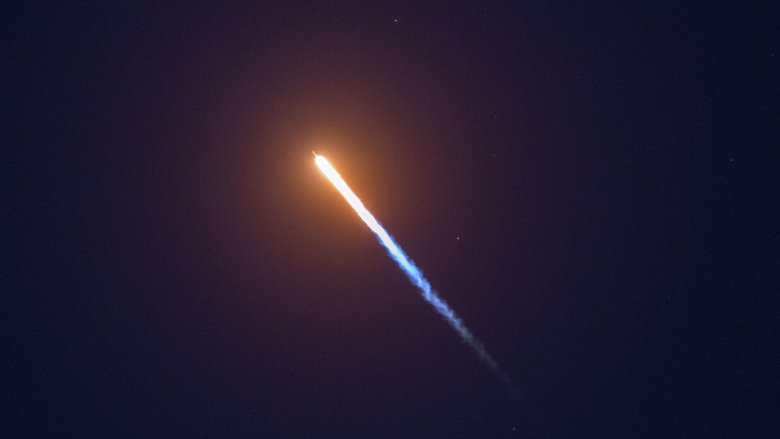The Untold Truth Of SpaceX
The world loves a supervillain, and that just might be what Elon Musk is. Maybe! He definitely blows a lot of stuff up, but so did Mythbusters and those guys were only sort of evil. He also invented a flamethrower and then posted a video of himself flame-throwing things and laughing maniacally, as evil geniuses do, before announcing that he planned to sell them for $500 a piece and that they could be used for roasting nuts (hopefully just the kind that you serve in a dish with a glass of beer). And then there was the time where he literally changed his Twitter profile image to a picture of himself stroking a cat with his pinky finger in the corner of his mouth like Austin Powers' Doctor Evil. And that other time when he joked that he was going to treat himself to a volcano lair.
Regardless of all that evidence, Musk is changing space travel as we know it. SpaceX, his private space company, is exploding its way into the hearts and minds of the American public, and occasionally successfully sending Tesla Roadsters and wheels of cheese into the great not-really-that-unknown-anymore. And if a few payloads full of human ashes and top-secret equipment get lost along the way, whatever. Supervillains don't have to care.
It actually is rocket science
For most of us, a career is preceded by a college degree and (maybe) some actual work experience. For Elon Musk, a career is preceded by shoving a pile of money across a table. Okay that's not really fair – according to Business Insider the guy did read some textbooks and ask actual rocket scientists a bunch of questions. For an ordinary person, that might be a pretty laughable way to break into the rocket science industry (or any industry), but Elon Musk isn't an ordinary person. Aerospace consultant Jim Cantrell called him "the smartest guy I've ever met, period." So the key is that he not only read rocket science textbooks, he also didn't fall asleep while he was reading them.
The real question is, why would a guy like Musk, who helped found PayPal, decide to start building rockets? Time magazine says he "just kind of decided to," although that's a simplified version of the story. When he wanted to send a greenhouse to Mars to see if the soil could sustain terrestrial plants, he realized there were no rockets capable of doing the job and figured he'd just build one himself. Oh, to be an internet billionaire.
Rusty nutgate
If your car has a rusty nut, you probably just keep driving it around until the engine falls out or something, and then you go, "Crap, the engine fell out, I should have fixed that rusty nut." If your rocket has a rusty nut, it falls out of the sky and destroys everything on board, so it's kind of a bigger problem.
According to Popular Mechanics, in 2006, four years after Elon Musk got into the rocket biz, the Falcon 1 was ready for launch. Techs working on the Kwajalein Atoll off the coast of Hawaii readied the spacecraft and loaded it up with the Air Force Academy's cadet-built FalconSat2 spacecraft, which was supposed to teach students about the effects of space plasma on communications satellites. Then they all stood around and shouted "Go!" and probably also "Woohoo!" and "Hooray!" and so on while the rocket lifted off and flew for exactly 34 seconds. And shortly after that, a room full of SpaceX techs and a bunch of seriously disappointed Air Force cadets watched their hopes and dreams of space flight and learning about space plasma disintegrate as a rusty nut came loose, fuel ignited and burned through a pneumatic line, and the rocket went crashing back to Earth, taking the FalconSat2 with it.
Nuts.
Beam me up, and up, and up
If you've dreamed of having your ashes launched into space where they will be forever free to explore the cosmos, you should totally not have SpaceX do it for you.
In 2008, some visionary at SpaceX decided there was a market for shooting the ashes of the departed into space, except for the part where SpaceX wasn't actually that good at shooting anything into space just yet. In 2008, the remains of 208 people boarded the Falcon 1, their loved ones said a tearful goodbye, and then five minutes after liftoff the first stage collided with the second stage and 208 would-be astronauts got more or less cremated for a second time.
Among those who did not reach the stars was actor James Doohan, who played Scotty in the original Star Trek series. This wasn't the first time Doohan failed to arrive at his final destination, either — according to The Telegraph, in 2007 his ashes were found on a New Mexico hillside after another failed launch.
It's not like there were 208 urns up there or anything, though. Celestis, the company that facilitates the ashes-in-space thing only takes 1 gram of cremains per person, but evidently asks for a little back-up cremains, too, "in case there is a problem." And if you're wondering, Scotty did eventually go where more than 1,000 other people have gone before, in 2012 aboard the SpaceX Falcon 9.
Here's a coupon
So what do you do when your customer's pizza arrives cold because your delivery person hasn't quite gotten the hang of quickly transporting precious cargo? You give your customer a discounted pizza. Now, what do you do if your customer's expensive cargo keeps blowing up because you haven't quite got the hang of the whole non-exploding rocket thing? You give your customer a discount because your customer is NASA and really, what else are you going to do?
In a 2016 report, NASA said SpaceX was offering cargo services at "discounted prices" and was also giving the space organization other "significant considerations," which probably included going on Starbucks runs and passing out moist towelettes in the executive washroom because you have to kiss some pretty major butt in order to calm down a group as important as NASA.
The report was issued a year after yet another Falcon failure in 2015, which destroyed $112 million worth of NASA's stuff, including some docking equipment and food, water, and air meant for the crew aboard the International Space Station (ISS). On a scale of 1 to sucky that lands somewhere between "lost the ashes of loved ones" and "actually crashed into the ISS, killing everyone on board." Fortunately, the ISS had enough provisions to make it to the next delivery window. Maybe they knew their stuff was coming via SpaceX and planned ahead.
We swear, this time you can trust us with your top-secret stuff
Because everyone always forgets the thing about history repeating itself, in January 2018 TechCrunch reported SpaceX launched a "mystery payload" code-named Zuma into space, which appeared to have been lost during that second stage separation (sound familiar?) Then like a kid who's been caught drawing on the wall one too many times, SpaceX said "It wasn't meeeee" and hoped Northrop Grumman would forget all about their billion dollars worth of spy stuff. "Falcon 9 did everything correctly," SpaceX president Gwynne Shotwell said in a statement. "Information published that is contrary to this statement is categorically false."
Even though the statement really does sound kind of whiny, as it turns out they were probably right — a few months later the U.S. government "tentatively concluded" that the spy satellite Falcon 9 was carrying actually fell back to earth because of some shoddy engineering and testing by Northrop Grumman, which must have been a huge relief for SpaceX. Still, it would not be surprising to hear that techs and execs spent a few weeks crunching some "what if we only ever shot human ashes into space" numbers because ultimately, 208 grams of mortal remains plummeting into the ocean seems like a much smaller problem than the splash-down of government-owned equipment worth billions of dollars.
Strings and sealing wax
If you want everyone to know your company is badass, you name your stuff after something else badass, like a dragon. Game of Thrones fans know a dragon is an almost unstoppable force, capable of wiping out entire armies and looking super-cool while sitting on top of castles. That's why Elon Musk decided to call his space capsule "Dragon," so everyone would know that SpaceX was a powerful presence in the space industry.
Just kidding. Actually, Musk called the capsule "Dragon" after the world's lamest dragon, the one that frolicks in the autumn mist and has the very much not-badass name "Puff." Dude, badass dragons don't "frolick." Can you imagine Khaleesi's dragons frolicking? And also, if your spacecrafts are prone to exploding you maybe don't want anyone thinking that strings and sealing wax have anything to do with it. Just some advice.
To be fair, though, Phys.org says the name was really meant to be a dig at those who didn't think SpaceX would ever accomplish anything. And most of the names Musk chooses for SpaceX craft have similarly cute origins: The "Falcon" rockets are named after Star Wars' Millennium Falcon, and as of 2016 Musk was reportedly planning to name the Mars passenger ship "Heart of Gold" after the starship in The Hitchhiker's Guide to the Galaxy, which was powered by an Infinite Improbability Drive. That's actually quite poetic considering the history of SpaceX but you know, really doesn't do a whole lot to inspire confidence.
Because space is too uncontaminated by cheese
Do you know what space needs more of? Cheese. Space needs more cheese. Because really, just about everything could use a little extra cheese.
Congratulations to SpaceX for recognizing the chronic absence of cheese in outer space and working hard to remedy the deficiency. In late 2010, Space.com reported that the "secret payload" that was launched into space on the maiden flight of the Dragon capsule was a wheel of cheese, and not just any wheel of cheese but French Le Brouere, which is a hard yellow cow's milk cheese similar to Swiss Gruyere.
The payload was actually a nod to a Monty Python sketch in which John Cleese enters a cheese shop and lists off the names of several dozen different types of cheese we never heard of, before concluding that like outer space, the cheese shop just doesn't have any cheese. Why Musk thought this meant he ought to launch some cheese into outer space takes a bit of contemplation, and afterward you'll probably just conclude that he watches too much TV. Not that it really matters because supervillains don't need to sleep and what else is he going to do in his off time, besides train sharks to eat his enemies?
No one seems to remember who got to taste the cheese after it returned to Earth, which is really the information we all wanted. But thanks anyway.
Next up, Iron Man suit
Actors often take inspiration from living people — Johnny Depp got his inspiration for Captain Jack Sparrow from Rolling Stones guitarist Keith Richards, and Robert Downey Jr. based at least some of his portrayal of Tony Stark on Elon Musk. That doesn't really seem strange when you consider both Musk and fictional Iron Man share some pretty undeniably similar qualities, like megalomania and having more money than they know what to do with.
Elon Musk evidently thinks the comparison is pretty okay, because he even had a cameo in one of the Iron Man movies (the second one, in which he spends 10 seconds discussing electric jet planes with the fictional superhero slash billionaire). According to Forbes, part of the film was also shot at SpaceX headquarters, so that was probably pretty good for Musk's ego, too.
Now it certainly wouldn't come as much of a surprise if we learned that Elon Musk's next big project was a flying, near-invincible iron suit or that he'd replaced his heart with a nuclear reactor, but we're not totally sure he'd actually use the technology to become a superhero because that would seriously cut into his television time. And also, supervillain. Besides, Musk is a famously awkward public speaker, which means he'd probably be terrible at superhero banter, and no one wants an Iron Man who's all iron suit and no witty retorts.
Don't worry, going to Mars is totally affordable!
So where exactly is SpaceX going with all this? To Mars, hopefully. Remember how Elon Musk conceived the whole plan for SpaceX after realizing he wouldn't be able to send a greenhouse to Mars? That initial disappointment has morphed into a plan to send a greenhouse to Mars along with an entire colony of people who hopefully will be vetted first to make sure they're awesome gardeners.
According to Space.com, Musk would ultimately like to offer what amounts to a shuttle service between here and the Red Planet, ferrying as many as 80,000 people to Mars for the bargain price of just $500,000 a ticket. The ambitious plan includes importing and building infrastructure like machines capable of producing methane and fertilizer (um, cows?) and the technology needed to extract oxygen from subsurface ice.
Evidently, Musk thinks the $500,000 price tag is totally affordable, comparing it to the cost of a home purchase in the state of California, while completely forgetting that most people don't actually pay for their homes in cash but over a period of 30 years or so, and oh by the way homes in California are anything but affordable. But perhaps he'll develop some sort of Martian economy that allows people to send mortgage payments back home every month, as long as he can also convince most banks that a person who lives on another planet is not a strong candidate for mortgage loan default. Details.
Internet for (almost) everyone
Just in case you've been thinking, "That's all well and good but what's SpaceX ever done for the common, non $500,000-having citizen of Earth?" Musk also hopes to bring satellite broadband to the world by launching 4,000 internet satellites into low Earth orbit. According to Cnet, if all goes as planned, the service will be available by the mid-2020s. Hopefully they've already addressed the problem where satellite internet totally sucks and you can't actually use it to stream The Walking Dead without getting throttled or charged ridiculous overage fees, because if not someone really needs to tell them that what they're doing has no actual purpose.
SpaceX hopes the revenue from its totally non-sucky satellite internet service will help fund its Mars colony, so its motivations aren't entirely altruistic. The fact that it's evidently a revenue-generating scheme does kind of call into question the notion of global broadband internet, since many of the people who need that kind of service the most are the ones who live in the world's poorest nations. But hopefully SpaceX spokespeople will know better than to tell farmers in sub-Saharan Africa things like, "$69.95 a month should be totally affordable, because that's what satellite internet costs in California." Because they can't all be that out of touch, can they?
Wait, do you have a license for that?
And then in the spring of 2018, the National Oceanic and Atmospheric Administration (NOAA) decided SpaceX vehicles weren't allowed to send video back to Earth anymore because they don't have a broadcast license.
In what was clearly a super-lame attempt to stop a supervillain, NOAA's sudden decision caused a video blackout that meant SpaceX wasn't able to broadcast images of the 10 Iridium satellites it had recently sent into orbit. According to Cnet, the decision was based on a reinterpretation of a law that's been in place since 2010, which supposedly says commercial space companies need to have a license in order to broadcast from Earth's orbit.
In what is perhaps the world's lamest official statement of all time, the director of the NOAA Commercial Remote Sensing Regulatory Affairs claimed to have no idea that SpaceX had cameras aboard any of its previous missions, which is sort of like admitting to the whole world that you're either totally making things up to make your organization look less incompetent, or your organization still doesn't have the internet so has no idea what is actually happening outside its own walls. Either way, you come out of that situation looking like the supervillain got the better of you, so that's embarrassing.




